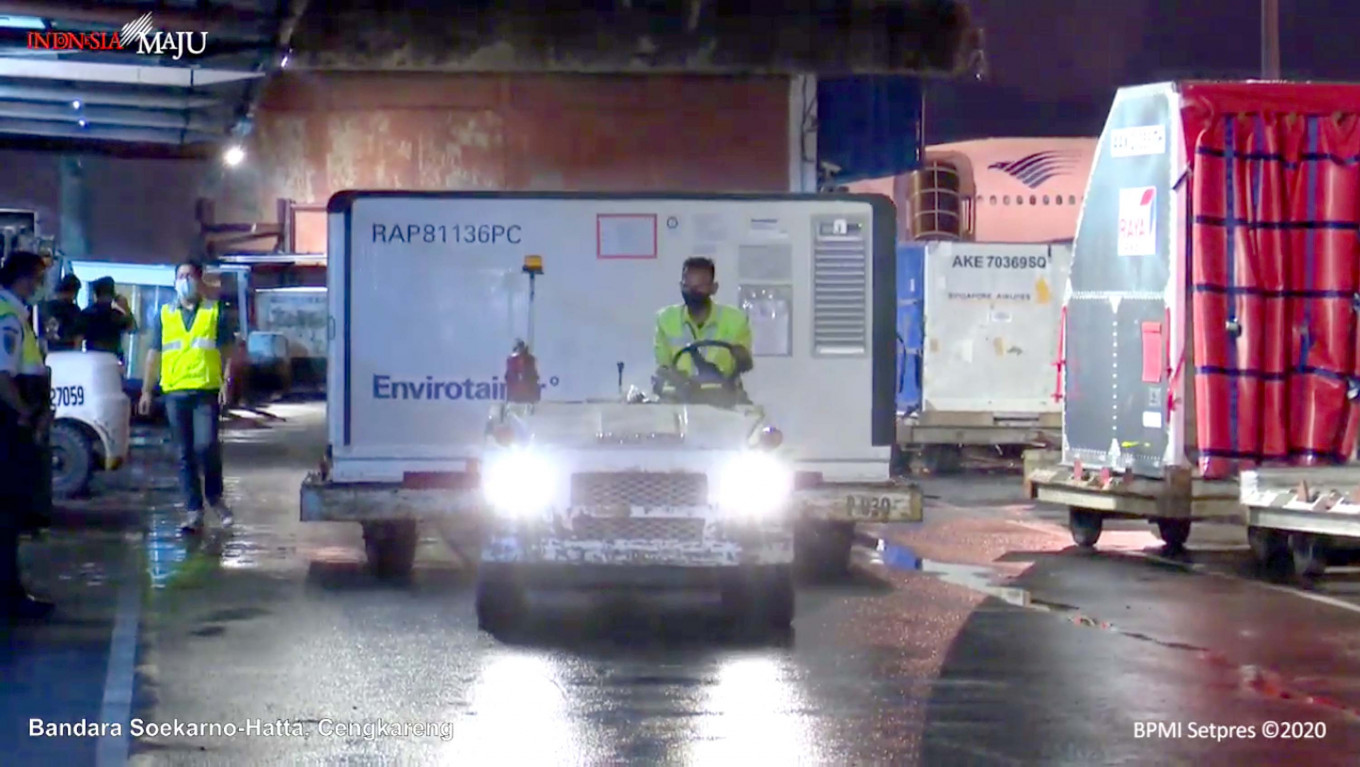Popular Reads
Top Results
Can't find what you're looking for?
View all search resultsPopular Reads
Top Results
Can't find what you're looking for?
View all search resultsFirst vaccines arrive in Indonesia from China
The government still needs to assuage concerns over the treatment’s real-world effectiveness and wait for the Food and Drug Monitoring Agency (BPOM) to greenlight the vaccine’s emergency use before it can begin inoculating people.
Change text size
Gift Premium Articles
to Anyone
T
he first consignment of the COVID-19 vaccine produced by China's Sinovac Biotech arrived in Indonesia late on Sunday, officials have said, sparking hopes of an end to the country’s struggle against the coronavirus outbreak.
However, the government still needs to assuage concerns over the treatment’s real-world effectiveness and wait for the Food and Drug Monitoring Agency (BPOM) to greenlight the vaccine’s emergency use before it can begin inoculating people.
A total of 1.2 million doses of the vaccine are now stored in a warehouse of state-owned pharmaceutical company PT Bio Farma in Bandung, West Java, having landed at Soekarno-Hatta International Airport in Banten on a flight from Beijing the night before.
A further 1.8 million doses of the ready-to-administer Sinovac vaccine are expected to ship in the next month. The state has paid a total of Rp 637 billion (US$45 million) for them.
On Sunday evening, President Joko “Jokowi” Widodo welcomed the Chinese delivery.
“Thank God, we are very grateful that the vaccine is available, which means that we can immediately start containing the spread of COVID-19,” he said.
Indonesia has been badly hit by the pandemic, with COVID-19 infections topping 580,000, and more than 17,800 deaths. The true scale of the crisis is believed to be much bigger, however, due in large part to the country’s low testing rates.
Nationwide vaccinations will commence after the state secures emergency use authorization from BPOM and halal certification from the Indonesian Ulema Council (MUI), State-Owned Enterprises Minister Erick Thohir said on Monday.
He hinted that authorization could be obtained after more vaccine deliveries in January, although others predict that vaccination will only begin in earnest in March.
BPOM head Penny Kusumastuti Lukito estimated that the approval could come in the third or fourth week of January.
The government is expecting deliveries of 15 million doses of vaccine bulk, an aqueous form of the purified antigens, before year-end and 30 million more doses next year. The vaccine bulk is to be used by Bio Farma to manufacture ready-to-use vaccines in the country.
In total, the government has ordered around 143 million doses from Sinovac in various forms, from the ready-to-administer doses to the vaccine bulk.
Health Minister Terawan Agus Putranto said on Monday that the state would prioritize health workers for the vaccines that had just arrived. It remains unclear when the government will roll out the vaccine for public use.
The Sinovac vaccine is one of several candidates that are in the final stages of testing globally, but it is also among a few whose efficacy results have not been disclosed.
The government has been in talks with other vaccine producers, including Sinopharm, United Kingdom-based AstraZeneca, United States-based Moderna, Pfizer Inc. and BioNTech.
While authorities in China have yet to clear any of the vaccines produced in-country for mass distribution, they have administered potential vaccines for emergency use with few – if any – reports of troubling results.
Sinovac has said it is confident about the safety of the potential vaccine, which has been tested on humans in several countries including in Indonesia since August.
An interim report comprising evidence of efficacy, immunogenicity and safety is to be delivered to BPOM in early January to help confirm use authorization.
Prior to the vaccine’s arrival, BPOM decided it would not authorize emergency use this month due to a lack of data on its efficacy.
However, experts believe it might not be enough for BPOM to take into account only the results of trials in Indonesia when deciding to confirm emergency use authorization, given the small pool of volunteers.
Instead, it must wait for results from other countries also running the trials, such as Brazil, said Wien Kusharyoto, a biotechnology researcher at the Indonesian Institute of Sciences (LIPI).
He said it would take at least 150 subjects, or about 10 percent of Indonesia's 1,620 volunteers, to be infected by the virus before the agency could even determine a vaccine’s efficacy – its effectiveness in controlled settings.
Only then could BPOM study how many people were infected from those who were inoculated, compared with those who were given a placebo.
Even then, only results that are above 70 percent efficacy are worth authorizing for public use. "It's more of a correct step to look for vaccines with higher proven efficacy from the results of phase three of clinical trial results," Wien said.
He called on the government to be transparent about the trials’ results, especially in regard to efficacy and safety, in order to reassure people about the vaccination program. After its launch, the vaccine use should continue to be monitored for adverse effects, which could result in revocation.
The aim of vaccination, he said, should be to cover a certain number of people to reach herd immunity – in which a population can be protected from a certain virus if a threshold of vaccination is reached.
Jokowi said on Sunday that all steps must be taken properly in order to ensure public health, safety and vaccine effectiveness.
“Scientific considerations, clinical trial results will determine when vaccination can begin,” he said.
The President also said it was important to prepare a vaccine distribution system to all regions in Indonesia, as well as supporting equipment, human resources and vaccination management.
“We know that we have made some preparations since a few months ago through simulations in several provinces, so everything has to be ready when we start a vaccination program,” he said.










